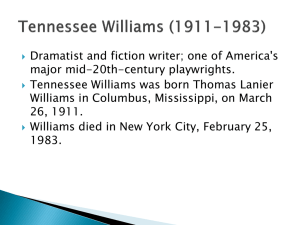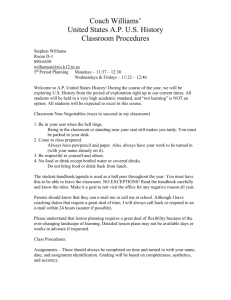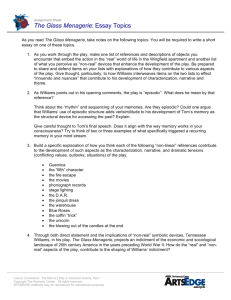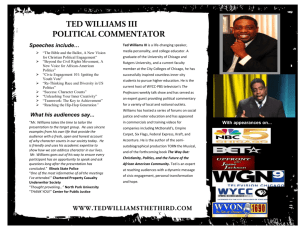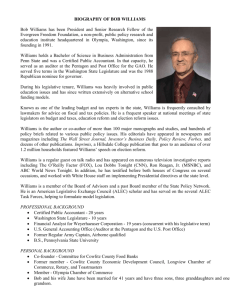Tennessee Williams and Diversity Consciousness
advertisement
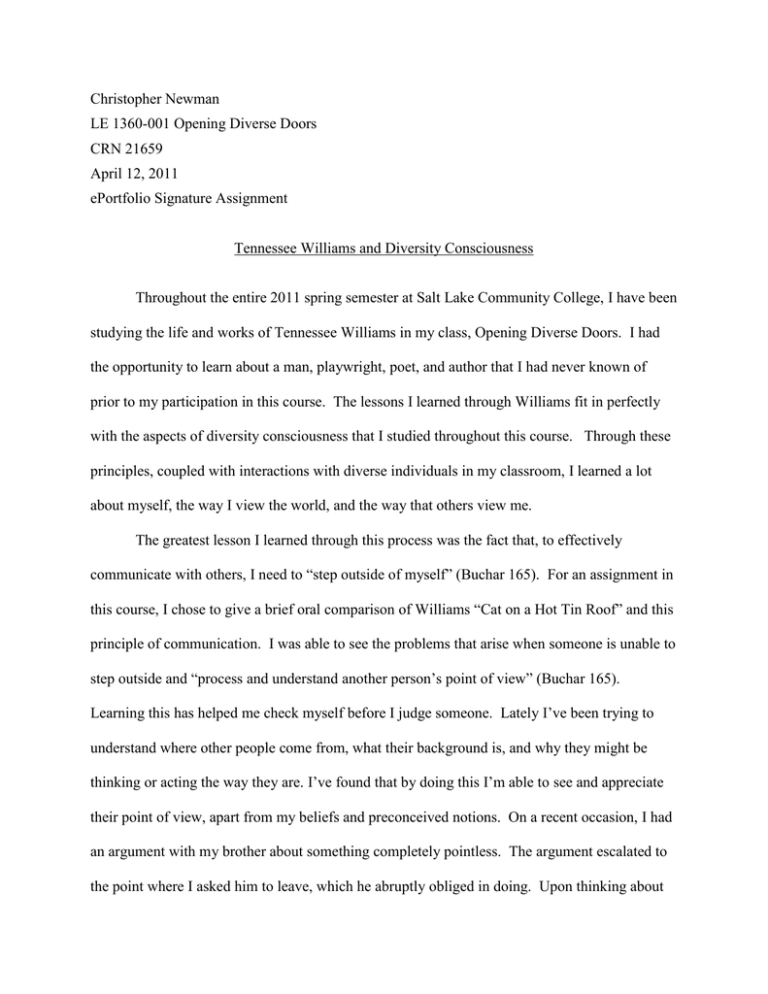
Christopher Newman LE 1360-001 Opening Diverse Doors CRN 21659 April 12, 2011 ePortfolio Signature Assignment Tennessee Williams and Diversity Consciousness Throughout the entire 2011 spring semester at Salt Lake Community College, I have been studying the life and works of Tennessee Williams in my class, Opening Diverse Doors. I had the opportunity to learn about a man, playwright, poet, and author that I had never known of prior to my participation in this course. The lessons I learned through Williams fit in perfectly with the aspects of diversity consciousness that I studied throughout this course. Through these principles, coupled with interactions with diverse individuals in my classroom, I learned a lot about myself, the way I view the world, and the way that others view me. The greatest lesson I learned through this process was the fact that, to effectively communicate with others, I need to “step outside of myself” (Buchar 165). For an assignment in this course, I chose to give a brief oral comparison of Williams “Cat on a Hot Tin Roof” and this principle of communication. I was able to see the problems that arise when someone is unable to step outside and “process and understand another person’s point of view” (Buchar 165). Learning this has helped me check myself before I judge someone. Lately I’ve been trying to understand where other people come from, what their background is, and why they might be thinking or acting the way they are. I’ve found that by doing this I’m able to see and appreciate their point of view, apart from my beliefs and preconceived notions. On a recent occasion, I had an argument with my brother about something completely pointless. The argument escalated to the point where I asked him to leave, which he abruptly obliged in doing. Upon thinking about his argument and realizing his situation and experience, being the youngest of all my siblings, I understood his point of view and why he had acted the way he did. I was able to set aside my views on the matter and see that his opinion was indeed valid. Another aspect of diversity consciousness that has had an effect on me is the principle of “Following Through” (Buchar 169). I never before realized that someone actually needed to consciously practice their communication skills on a daily basis to refine them. This realization has helped me to keep better tabs on my interactions throughout my day. In our in-class reading of Williams “The Glass Menagerie” and in my own reading of the play, I found several examples where following through with active listening could have prevented serious miscommunication and turmoil. The way Tom’s mother goes on and on about the things he needed to improve on while not listening or seeing the way it affected him was devastating to their fragile family. Reading and watching this part of the story opened my eyes to the importance of listening in communication. Speaking and actively listening are two parts of a whole that are essential to effective communication. This is why it is so important to follow through and cultivate a variety of communication and diversity skills. Generally speaking, the intimate view of Williams’ personal life had an impact on me. Seeing the trials and pain that Williams experienced in his lifetime really helped me to see value in others’ differences. I wouldn’t consider myself a discriminatory person, but I have realized that I sometimes listen or don’t listen to people based on their lifestyle or my first impression of them. If I had known Tennessee Williams during his life, there are things about him that I might not have found appealing and therefore may not have taken in his unique view of life. Now that I have read his poems and plays, seen video footage of him reading poetry, and studied the hardships he experienced in his life, I can see great value in his expression of himself. Because of this I have learned a lot about myself. It has made me wonder about how I express myself to others and the way that they see me and receive that I have to say. I know that I want others to take value in my opinion and I assume that most people feel the same way. To be honest, when I heard that this course was devoting so much time to studying just one man, I doubted whether or not it would be effective. Interestingly enough, it took almost the whole semester for me to see how diversity consciousness really encapsulates Williams’ life. If I hadn’t spent so much time reading his work and learning about his life, I wouldn’t have been able to, at least partially, see life through his eyes. Although there is a lot I still don’t know about him, or even diversity for that matter, I have learned to appreciate other people. I can see that what I have learned will benefit many different aspects of my life, especially my interactions with others throughout my education and whatever career field I choose. Everyone has a different story to tell and, especially to them, it is worth hearing about. Bibliography Buchar, R. (2010). Diversity Consciousness (3rd ed.). Columbus, OH: Prentice Hall

